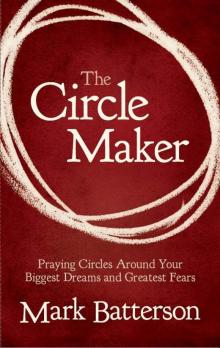- Home
- Mark Batterson
Whisper Page 13
Whisper Read online
Page 13
Mental Picture
National Community Church is now one church with eight campuses, but that wasn’t the original vision. With a failed church plant on my résumé, I was hoping for just one campus! Then God gave me a vision at the corner of Fifth and F Streets NE that changed everything. Not unlike the mental movie God gave Loren Cunningham, I saw a mental picture of a Metro map in my mind’s eye. I could envision NCC dotting the map in movie theaters at Metro stops all around the DC area.
When I first had that vision of meeting in multiple locations, multisite wasn’t even a word. Now we’re shooting at twenty expressions by the year 2020, and those expressions include church campuses, church plants, coffeehouses, and dream centers. I’m not sure where we’ll end up, but each and every expression has a genealogy that traces its origin back to a whisper at the corner of Fifth and F Streets.
God speaks in dreams, and one of the dialects is mental pictures. I’ve found that to be especially true when I’m praying for others. That may sound mystical, but I would argue that it’s biblical.
After David’s affair with Bathsheba, God restored him by sending a prophet to confront him. If the prophet Nathan had been too direct, I wonder if David would have reacted defensively. Instead, God gave Nathan a word picture that functioned like a Trojan horse. The prophet told a story about a lamb, which was no coincidence, given that David was a shepherd long before he was a king. That story bypassed David’s defense mechanisms, tapped the part of the heart that only stories can, and resulted in full-on repentance.
Nathan used that word picture for the same reason Jesus spoke in parables. Word pictures take a little more time and a little more effort to construct, but few things are more effective when it comes to speaking the truth in love.
Maybe that’s why God speaks in moving pictures and mental pictures.
A Little Crazy
When it comes to daydreams, I’ve had more than my fair share. When it comes to night dreams, I think I’m below average. I hardly ever remember my dreams, and when I do, they don’t make much sense to me. That said, I was recently challenged by my friend Kurtis Parks, who told me about his long-standing habit of asking God to speak to him through his dreams.
Before coming on staff at NCC, Kurtis was traveling and singing at camps and churches while holding down a day job in delivery. When he unexpectedly lost that job, he wasn’t sure how he’d make ends meet. Kurtis put it to prayer before going to bed one night, and he dreamed that night that he was leading worship at a church in Charlottesville, Virginia. The next morning Kurtis was awakened by a phone call from the pastor of that church, inviting him to come and lead worship that weekend. Kurtis even led “Salvation Is Here,”19 the same song he had seen himself leading in his dream. And the honorarium he received was a few dollars more than his monthly mortgage payment. “It was a powerful moment, knowing that God was aware of my anxiety in the awake world and gave me assurance in the dream world,” said Kurtis.
We tend to be skeptical of experiences we’ve never had, and that’s especially true when it comes to things such as night dreams. If we aren’t careful, we dismiss people as being a little crazy if they experience God in ways we haven’t. But maybe we’re the ones who are a little too normal. If there is a biblical precedent for God speaking through dreams, why wouldn’t we pray for the same experience? Maybe we have not because we ask not.20
My wife, Lora, and sister-in-law, Nina, recently spent a week in the refugee camps in Thessaloniki, Greece, with our missionary friends Tony and Jamie Sebastian. During their visit they met a refugee couple who shared their testimony with them. Emmanuel was born and raised in Iran, while his wife, Amanda, is from Kurdistan.
Emmanuel grew up Shia Muslim, so prayer was part of his religious routine. But when he prayed, he felt as if no one was listening. A friend gave Emmanuel a Bible, telling him that Jesus wanted to talk to him, so Emmanuel asked Jesus to reveal Himself if He was real. That is precisely what happened. Emmanuel had a vision of Jesus and heard His voice. His newfound faith in Christ put his life in jeopardy, so he fled his country. That’s how Emmanuel met his future wife, Amanda, in Istanbul, Turkey. It was more than love at first sight. God whispered to Emmanuel that Amanda was to be his wife despite the fact that they didn’t speak each other’s language. The day after they were married, Emmanuel was miraculously able to speak and understand the Kurdish language! No, that’s not a typo! It’s on par with what happened on the day of Pentecost.
The newlywed couple eventually fled Turkey and traveled by boat to Greece. The trip took longer than expected, and Amanda became deathly ill. One night a light came into their tent in their refugee camp, and Emmanuel heard a whisper that help was on the way. The next day two women showed up, saying God had sent them to help. They got Amanda to a hospital, but the doctors weren’t able to solve her symptoms. Then one night Amanda had a vision of Jesus standing by her bed, putting His hands on her head and praying for her healing. When she woke up, her symptoms were gone. The doctors didn’t want her to leave, but Amanda checked herself out of the hospital and was immediately baptized. This couple is now in training to be the first Arabic-speaking pastors of a church in Thessaloniki, Greece.
Just an ordinary day at the office, right? Maybe not to us, but miracles like that are happening all the time all around the world. Muslim refugees are coming to faith in Christ via visions, miracles, and the hospitality of Christians. And because many of them don’t have Bibles, God speaks through signs and wonders.
This might be an appropriate place for a reminder that God is doing now what He did then. And maybe He wants to do here what He is doing there.
Strange Visions
One of the strangest dreams recorded in Scripture is Peter’s vision of four-footed animals, reptiles, and birds being let down to earth in a sheet. Then a voice said, “Get up, Peter. Kill and eat.” I love Peter’s response: “Surely not, Lord!”21 I’m pretty certain if you’re calling someone Lord, the two words that should never precede it are “surely not.” But I understand Peter’s hesitancy. This dream seemed more like a nightmare because it contradicted every Jewish dietary law on the books. Peter must have felt like a vegetarian at an all-you-can-eat Brazilian steak house.
Let me zoom out and make a couple of observations. First, God-given dreams won’t contradict Scripture. One could argue that this vision was an exception to that rule, but the canon wasn’t closed yet. God was outmoding Jewish dietary laws while onboarding Gentile believers, and He accomplished both with one dream. A God-given dream won’t take you beyond the boundaries of Scripture, but it will stretch you to do things you didn’t know you were capable of even attempting.
Second, God-given dreams will confront prejudice. At that point in history, Christianity was essentially a sect of Judaism. The thought of Gentiles being grafted into Christ was so radical that the dream had to be repeated three times! Sometimes God has to force us outside our comfort zones. We want Him to do something new while we keep doing the same old thing, but it doesn’t work that way. His voice challenges the status quo and nudges us in new directions.
Third, the meaning of dreams isn’t always immediately discernible. If Peter had to process dreams, we probably will too. Some dreams make immediate sense, but others won’t make sense for decades. And dreams are like doors: often one leads to another, which leads to another.
Finally, if you want to establish God’s reputation, you might have to risk yours. Peter took a calculated risk when he entered the house of Cornelius. Technically speaking, it was against the Law. But like Paul, Peter “was not disobedient to the vision from heaven.”22 He preached the gospel, Cornelius repented, and the playing field was leveled between Jew and Gentile.
If you’re a Gentile believer, your genealogy traces back to that moment. Actually, it traces back to a double vision, a double whisper. Cornelius acted on the dream God gave him, and then Peter acted on the dream God gave him
, and they met in the miraculous middle.
We tend to view stories like this one as anomalies, but shouldn’t they be normalities? Just because we have access to the sacred text of Scripture, that doesn’t mean we should expect fewer miracles. Scripture ought to fuel our faith for more. If God can use a double vision to set up a divine appointment between an Italian soldier and a Jewish apostle, why wouldn’t He do the same for us?
Remember my bravest prayer, the prayer that God would heal my asthma? After I preached that message, a guest approached me and told me about a dream she had the night before. In her dream she laid hands on my lungs and prayed for them, and they were healed. She asked if she and her husband could do what she had done in her dream. Honestly, I was a little wary, because they were complete strangers. But the last thing I want to do is get in the way of what God wants to do, even if it seems a little strange to me. And the reality is, they took a risk even making that request. So I gave this couple permission to lay hands on me, as Scripture instructs,23 and to pray for healing. I don’t know what role that prayer played in my healing, but it’s a piece of the puzzle. It was a catalyst for and a confirmation of my healing. It was also a reminder that God works in strange and mysterious ways.
Pure Faith
On April 1, 1908, John G. Lake had a vision of himself being transported to South Africa and preaching. That dream was repeated several times, not unlike Peter’s vision. Eighteen days later Lake and his family left for Africa with $1.50 in their pockets. Lake was well aware that it would cost $125.00 to get his family of eight through immigration, which was nearly a hundred times what they had. But he felt as though God had told them to go.24
When their family arrived in South Africa, Lake got into the immigration line despite not having enough money to enter the country. That’s when someone tapped him on the shoulder and handed him $200.00. The Lakes boarded a train for Johannesburg, but they still had no place to live, so they prayed on the way there that God would provide. When they arrived, they were greeted at the train station by a woman named Mrs. Goodenough, who said that God had told her to give them a place to live.
It’s hard to calculate the influence of someone’s life, but John G. Lake was an integral part of a revival that swept across South Africa. He later returned to America, where he started forty churches.25 And perhaps his greatest influence was through a son in the faith, Gordon Lindsay, who founded Christ for the Nations.
Why did God use Lake the way He did? Well, if someone is willing to move his family of eight halfway around the world in response to a vision, God can probably use that person to do just about anything! His willingness to go anywhere and do anything was unparalleled, and so was his hunger for God.
Lake once said, “I believe I was the hungriest man for God that ever lived.”26 It’s tough to judge a self-assessment, but I will say this: If you stay humble and stay hungry, there is nothing God cannot do in you or through you. In fact, the humbler you are, the bigger the dream God can entrust to you, because He knows that He’ll get the glory.
One last reminder. The goal of going after a God-given dream isn’t just accomplishing it. In fact, accomplishing the dream is of secondary importance. The primary goal is who you become in the process. Big dreams make big people because we have to trust a big God. Nothing keeps us on our knees like God-sized dreams. They force us to live in raw dependence upon God. Without Him, the dream cannot be realized. God-sized dreams force us to lean in a little closer, and that’s when God has us right where He wants us.
HIDDEN FIGURES
The Fifth Language: People
We are surrounded by such a great cloud of witnesses.
—HEBREWS 12:1
On February 20, 1962, John Glenn sat atop a ninety-five-foot-tall intercontinental ballistic missile at Cape Canaveral. After eleven delays capsule communicator Scott Carpenter finally uttered the famous phrase “Godspeed, John Glenn,”1 and the Mercury-Atlas 6 blasted off from Launch Complex 14. It reached a velocity of 17,544 miles per hour, orbited Earth three times, and splashed down four hours, fifty-five minutes, and twenty-three seconds later eight hundred miles southeast of Bermuda.2 John Glenn was an instant hero—the first American to orbit Earth. But even heroes need help. And epic stories often have even better backstories.
The greatest challenge facing NASA wasn’t getting a man into space; it was returning him safely to Earth. And that’s where Katherine Coleman Goble Johnson entered the equation. Calculating Glenn’s reentry into Earth’s atmosphere required the brightest mathematical minds, and Katherine was chief among them. But she had to overcome two significant challenges: It was a white world in 1962, evidenced by the bathrooms designated specifically for black employees at Langley Research Center. And it was a man’s world. But you can’t keep a good woman down.
When it came to calculating trajectories and computing launch windows, no one was better than Katherine Johnson. NASA had purchased their first IBM computer a few years earlier, but John Glenn trusted human computers more than the machine version. In fact, he wasn’t willing to take off until Katherine checked the numbers. So John Glenn made a special request: “Get the girl to check the numbers.”3
I don’t want to overstate the facts. Perhaps NASA could have found someone else to verify the numbers, but play along for a minute. If Katherine didn’t do what she did, I’m not sure John Glenn would have done what he did. And if John Glenn had not orbited Earth, we wouldn’t have shot the moon. And if we didn’t land a man on the moon, the Soviet Union would have. And if the Soviet Union had won the space race, they might have won the Cold War.
Here’s my point: there are people we’ve never heard of, hidden figures, who have changed the course of history in ways we’re totally unaware of. I’m not sure any of us would even know Katherine Johnson’s name if she hadn’t been awarded the Presidential Medal of Freedom at the age of ninety-seven.4 Well, that and an Oscar-nominated film. And Katherine Johnson helped put a man on the moon, for goodness’ sake!
Behind every John Glenn, there is a Katherine Coleman Goble Johnson. And that trend is true in Scripture too. Behind Moses, there is Aaron. Behind David, there is Benaiah. Behind Esther, there is Mordecai. Behind Elisha, there is Elijah. Behind Timothy, there is Paul. In the words of English poet John Donne, “No man is an island entire of itself.”5
Do you know why C. S. Lewis went to church? It’s not because he loved the songs. He thought they were “fifth-rate poems set to sixth-rate music.”6 It’s not because he loved the sermons. And it’s not because he liked the people. He didn’t. Lewis went to church because he believed that if he didn’t, he would fall into something he called solitary conceit. He knew that we aren’t designed to make it on our own.7
When we isolate ourselves from others, we become islands unto ourselves. And like Tom Hanks in the movie Cast Away, we eventually draw a face on a volleyball, name it Wilson, and start talking to it.
You know why God puts people in our lives? It’s not just to overcome solitary conceit; it’s also to overcome solitary confinement. He puts people in our lives to keep us humble and to draw out our potential. I like to think of it as human pinball; we bump into different anointings, different giftings, different ideas. Somehow God uses those relational encounters to get us where He wants us to go.
Did you know it took approximately four hundred thousand people to put a man on the moon? It took a twenty-six-year-old mission controller named Steve Bales. It took a twenty-four-year-old computer whiz named Jack Garman, who memorized every alarm code. Then there was Robert Carlton, who was in charge of monitoring fuel consumption. He’s the one who, after the module had traveled 240,250 miles, announced that they had only sixty seconds of fuel left to land the module or they’d have to abort. And don’t forget Eleanor Foracker, a seamstress who worked for the company that designed the space suits. She and her colleagues got a little nervous when the astronauts started jumping on the moon, b
ut her seams held tight. That’s four names out of four hundred thousand, but you get the point.8 No one shoots the moon alone.
Each of us is a link in the chain of “begats” that started with Adam and Eve. The chain is filled with unsung heroes who won the day and hidden figures who saved the day. We all stand on one another’s shoulders. The writer of Hebrews calls this human chain the cloud of witnesses.
Since we are surrounded by such a great cloud of witnesses, let us throw off everything that hinders and the sin that so easily entangles. And let us run with perseverance the race marked out for us.9
We all have a cloud of witnesses, and that cloud consists of anybody and everybody who has influenced our lives. It’s our family and friends, coaches and teachers, and, I’d like to think, pastors and authors. To believe that any of those people are in our lives by happenstance is to grossly underestimate the sovereignty of God. He wants to use them to speak into our lives, and He wants to use us to speak into theirs.
A Spirit of Timidity
The fifth love language of God is people. Yes, God can speak through a donkey, but more often than not, He uses people. He used a prophet named Nathan to rebuke King David. He used an uncle named Mordecai to exhort Queen Esther. And He used a spiritual father named Paul to encourage Timothy: “God has not given us a spirit of timidity, but of power and love and discipline.”10

 Jack Staples and the Ring of Time
Jack Staples and the Ring of Time Jack Staples and the City of Shadows
Jack Staples and the City of Shadows Jack Staples and the Poet's Storm
Jack Staples and the Poet's Storm Whisper
Whisper The Circle Maker_Praying Circles Around Your Biggest Dreams and Greatest Fears
The Circle Maker_Praying Circles Around Your Biggest Dreams and Greatest Fears